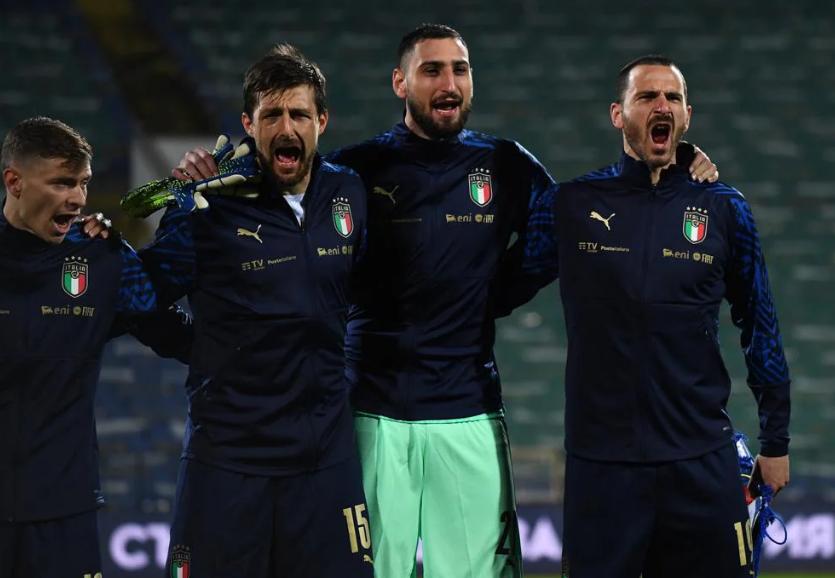Italy's World Cup qualifiers against Bulgaria saw an interesting scene.
In the process of playing the national anthem before the game, the camera swept through the Italian internationals from right to left, after Bonucci, Donnaruma, Archer, starting with Barrera, the director specially lowered the camera angle - because from Barrera, the Italian team's "altitude" dropped sharply, and The 1.72-meter-tall Barrera became the number one giant in the Italian midfield, a rare spectacle.

Italian coach Mancini has always been the key to selecting players, but as for height, strength and the like, it is only secondary.
In this battle, he discharged a rare "three short midfielders": Verratti at 1.65 meters, Sensi at 1.68 meters, and Barrera at 1.72 meters.
Not only the midfielder is collectively short, but counting Insigne, Chiesa Jr., and Florenzi in the attacking line, the entire Italian starting lineup, except for the defender goalkeeper and Belotti, is composed of short players.
Some shots swept by, and Barrera also seemed to be much taller, all of which were set off by teammates.
Arranging the lineup in this way, of course, will have side effects.
For example, the Italian team is in a comprehensive disadvantage in terms of competition and confrontation. Against the feet, the Italian team won less than 40%. Head confrontation, the winning rate is only 30%.
Italy played very badly and did not seal the victory until the end of the match.
Therefore, the Italian media bigwigs have raised many questions about Mancini: it is not that there are no tall players to choose from! Jorginho's injury is a fact, but why not use Pellegrini? Why not let Locatelli start?
The Italian media's criticism of Mancini is not only in terms of short stature, but also in Sensi.
Sensi's question has been discussed before. Because of injuries, because of psychological shadows, Sensi has played an average of a few minutes a month at Inter in the past few months, and has not played for the Nerazzurri for a year and a half, Conte and others have gradually become accustomed to not counting him as a standing force, and most Inter fans no longer dare to have confidence in saving Sensi.
But in the Italian team, Sensi has a very strong position, the last 4 national team training, Sensi has been called up. And every time I got a chance to play - not a walk off the bench, but a real start.
Mancini's particular preference for Sensi has caused dissatisfaction among many Italian journalists.
The critics of Sensi by the bigwigs are ostensibly based on concerns that Sensi has too little playing time in the league.
But people familiar with the Italian football "jianghu" know that there are also some other thoughts hidden in it - now that Serie A is no longer the peak of the "Small World Cup", league performance alone is not enough to support players to brush out the high price recognized by the ball market, so some teams, especially those that rely on selling people to make a living, are staring at the opportunity for the Italian national team to play, counting on Mancini to let their players play, brush a high price, and sell profits.
They had this in mind, and the mouthpiece media and royal reporters waved their flags and tried to influence Mancini's decision in a humiliating and critical manner to win opportunities for the internationals in their interest groups. Don't be surprised.
But Mancini seized every opportunity to provide Sensi with playing time, and the Italian coach not only admired Sensi's foot skills, but also recognized his tactical suitability, hoping to use him as an Italian team's "universal" and "versatile" player.
When Verratti was injured, Sensi played mezalla (a full-back) in place of the Paris midfielder. Sensi often scores or assists, and has a lot of success.
Now that Jorginho is injured, Sensi has replaced Chelsea midfielder as DLP (the core of the rear organization), although Sensi did not have many bright spots in this battle, but in the position he does not often play, he also played well.
In this battle, Sensi was slightly restrained, did not try a breakthrough, or was afraid of being injured. However, Sensi only played 68 minutes, but he was the player with the most forward passes from the Italian team, the most incoming attacks in the three zones, and the defensive data contribution was above the average level, completing the task that Mancini gave him.
Critics continued to criticize Sensi after the game, after all, just being decent was not enough to quell the controversy. Moreover, critics have other undertones: the tall Locatelli made a contribution immediately after the substitution, and sensi, who started the game, did not win, which proved that Mancini's "nepotism" was wrong.
In the face of criticism, Mancini said after the match: "Sensi played a great game. Locatelli also did well. The different words are both a defense of Sensi and a sharp response to critics.
Sensi was also very grateful to Mancini after the game: "I am very happy because I have not played for a long time. I have to thank the coach for the trust he has placed in me. "The pair of generals can be described as hand in hand and heart to heart.
That's Mancini's character: critics don't believe it's not the right thing to do when Italy plays in a bunch of short midfielders; critics dismiss it when they think it's unreasonable to rely on Sensi; critics dismiss it because he thinks he's too friendly to Inter.
His strength comes from Italy's 24-game unbeaten record – Lippi's longest unbeaten record since 2006.
Whether it's out of a football philosophy or an emotional preference, in short, Mancini has his persistence, and he proves that he is a fighter ready to fight critics to the end.